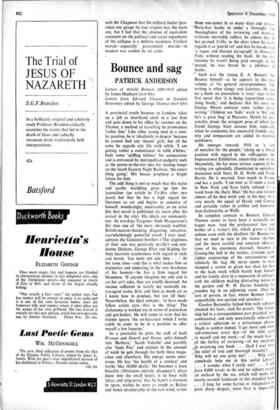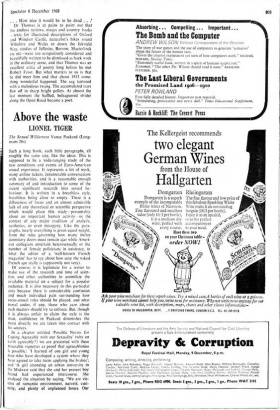Bounce and sag
PATRICK ANDERSON
Letters of Arnold Bennett 1889-1915 edited by James Hepburn (our 84s) Letters from Edward Thomas to Gordon Bottomley edited by George Thomas (out' 63s) A provincial youth bounces to London, takes up a job as shorthand clerk in a law firm and goes down to his office by steamer on the Thames, a method of travelling he pronounces 'rather fine.' Like other young men in a simi- lar position, he is 'absolutely in despair' because he cannot find any 'decent' girls, but all the same he regards city life with relish, 'I am getting rather a connoisseur in table d'hOtes,' finds some `spiffing fellows' for companions and is entranced by metropolitan gadgetry such as the penny-in-the-slot idea for reading lamps on the South Eastern Night Railway, 'the cutest thing going.' His bosses prophesy a bright future for him.
The odd thing is not so much that this naive and earthy worldling gives up law for journalism (an article in Tit-Bits after two years) but that he has a high regard for literature as art and begins to conceive of himself, wonderingly, uncertainly, as an artist (his first novel is published six years after his arrival in the city). His ideals are cosmopoli- tan: he worships Turgenev, finds Maupassant's Be! Ami one of 'the most obviously truthful, British-matron-shocking, disgusting, attractive, overwhelmingly powerful novels I ever read,' admires the Goncourt brothers ('The singleness of their aim was positively terrific') and con- demns Dickens, George Eliot and Kipling for their inartistic carelessness with regard to style and words. 'Les mots out une ame . . .' At the same time—and this is what makes him so distinctive and endearing in the very brashness of his honesty—he has a firm regard for Mammon. 'If anyone imagines my .sole aim is art for art's sake, they are cruelly deceived. An income sufficient to satisfy my -naturally ex- travagant tastes, first, and then as much art as I know how to produce, but not till then.' Nevertheless, the ideal remains: `to have made fellow artists care—that is the thing.' The dichotomy is worked out in terms of journalism and pot-boilers. He will come to wish that his friends ignore 'the un-literature which I write solely in order to be in a position to offer myself a few luxuries.'
As a journalist he joins the staff of both Woman and Hearth and Home, splits himself into 'Barbara,' Sarah Volatile' and possibly also 'Aunt Pen,' and rejoices in the amount of work he gets through for both these maga- zines and elsewhere. His energy seems enor- mous. He has 'the health of a cowboy' and works 'like 10,000 devils.' He becomes a keen bicyclist ('Distances entirely disappear'), plays duets into the small hours, is so busy with 'plays and ping-pong' that he hasn't a moment to spare, wishes he were as tough as Balzac and hence invulnerable to the east wind, writes three one-acters in as many days and reviews "thirty-five books in under a fortnight. be thoroughness of his reviewing and dramatic "criticism inevitably suffers; he admits that he has praised Trilby to the skies when he really
'regards it as 'putrid rot' and that he has devoted
'a vague and discreet paragraph' to AIntayer's Folly without reading the book. In the first
instance he wasn't being paid enough, in the "I.second, he was bored by • a plethora of books.
4- Such was the young E. A. Bennett—Mt Bounce himself—as he appears in this first
volume ol his general correspondence. The
'writing is often slangy and facetious. He can do a book on journalism 'a treat,' says of his first novel that 'it is being typewritten some- thing lovely,' and declares that his essay on George Moore contains some 'rather classy
writing.' Children are 'kids,' work is 'biz' anti he's 'a great bug' at Pearsons. Slowly his per- sonality drops the arrogant pose, of which his
friend George Sturt accuses him, especially when he condemns less successful friends; die- nity and compassion are added to essential quirkiness.
He emerges towards 1914 as 'a sort of moralist for the people,' taking up a liberal position with regard to the suffragettes, the ,Impressionist Exhibition, censorship and so on. Meanwhile, the far more serious aspects of his
writing are splendidly illuminated in epistolary discussion with Sturt, H. G. Wells and Frank Harris. He is married, lives much in France and has a yacht. 'I am now at 33 cents a word
in New York and have lately refused 1/- a 'word from the Daily Mail.' He has also written almost all his best work and, at his best, he is very nearly the equal of Hardy and Conrad and certainly richer in artifice and humanity than Galsworthy or Wells.
In complete contrast to Bennett, Edward Thomas seems to have been a naturally un-
happy man. And the professional fuss and bother of a writer's life, which grows a little tedious even with the ebullient Mr Bounce (so that we need to turn to the slower rhythms
and the more careful and concrete observa- tions of his enormous Journal), becomes a
Gissing-like hell in the restless; irritated, guilt- ridden outpourings of the conscientious and 'Scholarly Mr Sag. He never seems to have
skimped a review or given less than his best to the hack work which barely kept himself and his family alive in a succession of cottages, with the children making distracting noises in the garden and W. H. Davies breaking his wooden leg in an adjoining room. (Just the sort, of person, in fact, whom Bennett found . ,unjustifiably low-spirited and spineless.) Gordon Bottomley helped him with subjects. checked his facts, read his proofs. The friend- ship led to a correspondence part practical, part confessional, and only occasionally relieved by a critical aphorism or a picturesque phrase. Much is sombre indeed. 'I get more and more self-conscious every day—of the little good „,in myself and my work,—of the much bad.— .511 the futility of reviewing—of my insolence ,Ap reviewing any book . . . Shall I ever hme „the relief of true and thorough insanity? . . • Why will no one print me? . . . Why col somebody help me in this awful labour? . . . I wonder what I really am? . . . I still „have 8,000 words to do and no subject except an orchard by the sea, which will make my twenty-seventh landscape in this dreadful book , . . I long for some hatred or indignation or 'even sharp despair,-. since love is impossible
. . How nice it would be to be dead ,.. : Dr Thomas is at pains to point out That the endless reviews, essays and country books —texts for illustrated descriptions of Oxford and Windsor ,Castle, naturalist's hikes round Wiltshire and Wales or down the Icknield Way, studies of Jefferies, Borrow, Maeterlinck etc etc—were too scrupulously considered and beautifully written to be dismissed as hack work in the ordinary sense, and that Thomas was an excellent critic of poetry long before he met Robert Frost. But what matters to us is that he did meet him and that about 1913 some- thing wonderful happened. The sag tautened with a melodious twang. The accumulated tears flew off in sharp bright pellets. At almost the last moment the baffled, beleaguered strider along the Open Road became a poet.



































 Previous page
Previous page